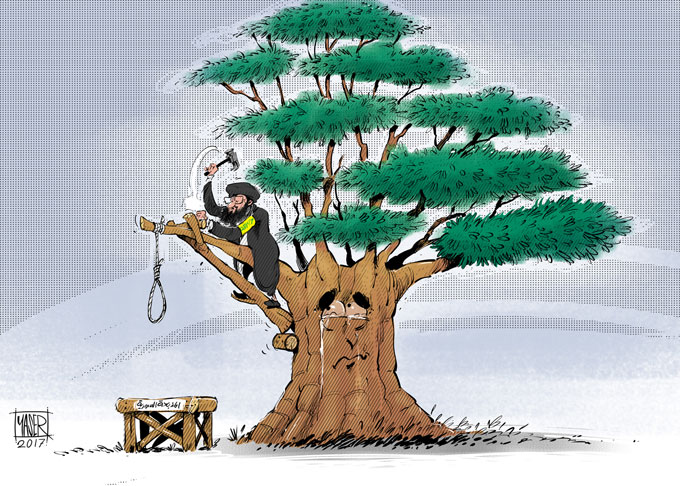Nasrallah, Iran, and Israel’s end game
تحليل بقلم شمتريت مئير/يديعوت أحرونوت: نصرالله، إيران، ونهاية لعبة إسرائيل
Shimrit Meir/Ynetnews/January 16/19
Opinion: Perhaps Hezbollah’s secretary-general is not 100% well, or perhaps he’s simply employing a new media strategy following IDF operation to destroy his organization’s attack tunnels – one of enigmatic silence.
At its inception, Operation Northern Shield has made a lot of noise in the media, but it all ended rather quietly. Nevertheless, over the past six weeks the Israel Defense Forces has located and neutralized six terror tunnels dug from Lebanon into Israeli territory by the Hezbollah terror group, making the terror organization’s dream of raising its flag on Israeli soil less and less likely.
And while the millions of dollars and years of Sisyphean work invested in building the tunnels goes down the drain, Hezbollah Secretary-General Hassan Nasrallah remains silent. Why?
Nasrallah’s lack of comment and indeed his disappearance from the public eye over the past few weeks—aside from a courtesy visit he paid to the newly elected leader of the Palestinian Islamic Jihad, Ziad Nakhala (of which there was no footage)—are so peculiar that they sparked a wave of rumors and speculation about his medical condition.
Perhaps Hezbollah’s secretary-general really is not hundred percent well, or perhaps he is adopting a new media strategy of enigmatic silence.
Nasrallah loves to talk, and he loves to make threats even more. His decision to belittle and ridicule Operation Northern Shield is akin to his decision to dismiss Israeli strikes on Hezbollah targets in Syria. In both cases, Nasrallah avoids climbing tall trees. Instead of threatening retaliation, he prefers to sit and wait. In the meantime, he has other domestic issues that demand his attention.
Eight months have passed since elections were held in Lebanon, and a new government has yet to be formed, something that also influences Nasrallah’s conduct.
The Shiite terror organization understands that without the help of Lebanese Prime Minister Saad Hariri, who is favored by the West, the funds Lebanon so desperately needs will not be infused into the country. Any intransigence in coalition talks could raise questions about the Iranian-backed organization’s loyalty to the state. On the other hand, Hezbollah refuses to give up what it has accomplished in the elections, which creates a challenging and maybe even unsolvable equation. The result is a country at a standstill.
Some in Israel expected that the discovery of the tunnels would politically harm Hezbollah, portraying them as destabilizing warmongers. But the IDF’s decision to stay on the Israeli side of the border throughout the operation stirred sympathy for the terror organization among the Lebanese public.
Nasrallah’s personal silence over the tunnels was perceived as an indication of responsibility, while the Lebanese army—in Hezbollah’s service—observed the frontier to prevent IDF troops from crossing the border even by an inch. This inspired the respect of the Lebanese people, and maintained a balance of deterrence between both sides.
Hezbollah is monitoring the wall Israel is building along its northern border. This new barrier reflects the profound and ongoing change in the Jewish state’s outlook, which went from waging a war beyond enemy lines to standing its ground behind concrete or iron walls.
Instead of being dragged into a new operation every other day and investing useless and expensive efforts to harm Iran’s proxies—Hamas, Islamic Jihad, and Hezbollah—Israel’s new strategy is to directly target the Islamic Republic and its entrenchment attempts in Syria, while avoiding military adventure at all costs.
But Qassem Suleimani, commander of the elite Quds Force and the Iranian Revolutionary Guards’ strongman, has also adopted a different approach. Suleimani believes in an ongoing revolution—from Syria to Iraq to Yemen and even Israel or Palestine. He is preparing the ground for the day he takes command in the Galilee and the Golan Heights.
A chess cliché is useful when talking about Iran: Israel is moving its pieces into multiple, interlinked places to do battle against Suleimani. Gaza is connected to Lebanon, which is connected to Syria, and everything is connected to Iran.



















